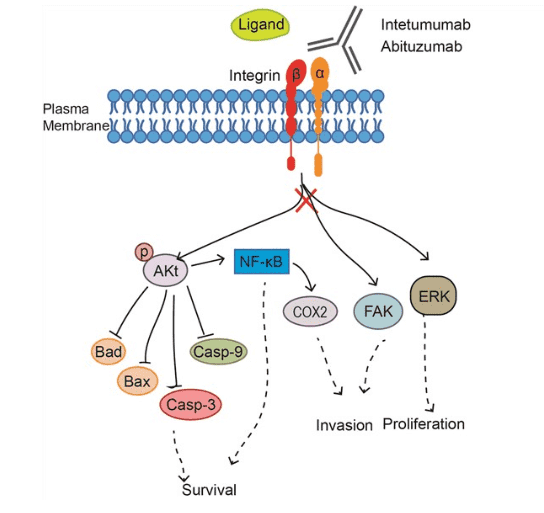Intetumumab Overview
Introduction of Intetumumab
Intetumumab is a fully human IgG1 monclonal antibody that targets to integrin alpha-V (ITGAV), which is encoded by the ITGAV gene. This drug was developed with the expectation for the treatment of solid tumors and has been investigated in trials studying the treatment of malignant melanoma and prostate cancer recently. A study to understand the growth inhibition mechanism of intetumumab and identify a molecular signature associated with sensitivity to intetumumab has been conducted on lung cancer cell lines. By detecting gene expression, study has found that lung cancer sensitivity to intetumumab is associated with several chromosomal alterations, particularly genetic loss at chromosome arm 19p. Additionally, a gene signature that has potential to predict intetumumab sensitivity for lung cancer cell lines has identified.
A phaseⅡ study of metastatic castration-resistant prostate cancer has conducted using intetumumab in combination with docetaxel and prednisone. Results showed that combination of intetumumab with docetaxel shortened the PFS without additional toxicity, and the efficacy of 10 mg/kg intetumumab in combination with docetaxel deserves further study. Another phaseⅡ research of melanoma has investigated the impaction of intetumumab on angiogenesis and melanoma tumourigenesis alone and with dacarbazine. Study has shown that intetumumab has a good prospect on the treatment of melanoma with its favorable safety profile and a non-significant trend towards improved OS. Furthermore, intetumumab was evaluated for safety, pharmacokinetics, and pharmacodynamic activity in the treatment of melanoma or angiosarcoma. Intetumumab showed an activity of manageable toxicity and well tolerated, and presented approximately dose-proportional pharmacokinetics for the 10 mg/kg and 20 mg/kg doses. In addition, study on the treatment of endometrial cancer with intetumumab has demonstrated that the USPC cell adhesion and migration was significantly inhibited, suggesting a novel treatment option for this highly aggressive cancer.
Mechanism of Action of Intetumumab
The targeted molecular of intetumumab is integrin αv, which could form multiple integrins with different beta units. Integrins are transmembrane receptors that function mechanically, by facilitating the cell cytoskeleton adhesion to the extracellular matrix (ECM), and biochemically, by sensing whether adhesion has occurred. Most integrins bind to its ligands with their extracellular head region and others bind counter receptors on neighboring cells, bacterial polysaccharides, or viral coat proteins. Integrins transduce biochemical signals into the cell via downstream effector proteins when binds to the extracellular ligands such as fibronectin, vitronectin, collagen and laminin. The signals mediated by integrins regulate the activities of cytoplasmic kinases, growth factor receptors, and ion channels and control the organization of the intracellular actin cytoskeleton. Previous studies has demonstrated integrins that contain the αv subunit promote the occurrence of malignant tumors, such as melanoma, renal cancer, colorectal cancer, and PCa. Inhibition of αv integrin activation has been shown to reduce cell survival, induce cell cycle blockade, and also reduce tumor growth and metastasis, providing the desired anti-tumor effect for clinical treatment. Based on these findings, the integrin αv subunits has been considered as an effective clinical therapeutic target for tumors. Intetumumab is a pan alpha-v human mAb that recognizes αvβ1, αvβ3, αvβ5 and αvβ6 integrins. Upon administration, intetumumab binds to integrins contained αv chain, blocking the interaction between integrins and its ligands and resulting in inhibition of integrin-mediated tumor angiogenesis and tumor growth.
 Fig.1 Mechanism of action of Intetumumab
Fig.1 Mechanism of action of Intetumumab
For research use only. Not intended for any clinical use.
This site is protected by reCAPTCHA and the Google Privacy Policy and Terms of Service apply.



